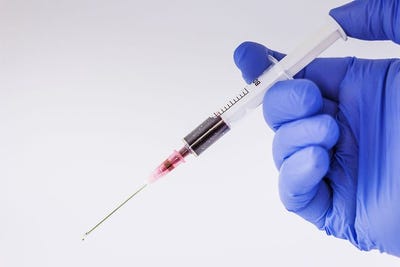The Liquid Biopsy Surge Is Reaching Beyond Cancer
August 9, 2017
Investors just poured $50 million into a blood-based test for infectious diseases, developed by Karius Inc.
Amanda Pedersen

Liquid biopsy has attracted a surge of companies that are trying to change the way cancer is detected and monitored. But the benefits of this new type of technology can - and should - seep into other disease categories.
Karius Inc. is already leveraging liquid biopsy technology to give doctors an upper hand on difficult-to-diagnose infectious diseases. The startup just raised $50 million to support clinical trials, scale up its laboratory space, and get the test into the hands of more doctors. Data Collective and Lightspeed Venture Partners co-led the financing, with participation from Tencent, Khosla Ventures, Endeavors, and Spectrum 28.
Karius CEO Mickey Kertesz, PhD, said the inspiration for the company originated in 2014 while he and other researchers were at Stanford University studying cell-free DNA signals from organ transplant patients. It was through that work that the researchers figured out there was a weak signal coming from microbes.
"And the question we asked was 'can this signal be enhanced and used, potentially for diagnostic purposes in infectious disease'," Kertesz told Qmed.
The Karius test uses a combination of machine learning, genomics algorithms, and next-generation sequencing to enable the broad and rapid detection of more than 1,250 pathogens. The company recently moved into a new 25,000-square foot facility, significantly increasing its laboratory space and the capacity to process more tests.
Using a standard blood draw, the Karius test identifies cell-free DNA fragments left by bacteria, viruses, fungi, and other eukaryotic pathogens in a patient's bloodstream, when living organisms are no longer detectable in the blood, according to Karius. The company said it's the first to put microbial cell-free DNA analysis data into the hands of clinicians, making it commercially available through its laboratory service. The company can usually provide a diagnosis within one business day of getting a blood sample.
The company's investors are clearly sold on the technology's potential.
"Karius is providing doctors with critical information that can save lives that would be otherwise lost to infectious disease. This new financing will help Karius do this on a global scale," said Matt Ocko, managing partner at Data Collective, which also provided the company's seed money.
In June, the company presented data at the American Society for Microbiology's Microbe 2017 conference in New Orleans that demonstrated the broad pathogen detection capability of the Karius Digital Culture test.
"Clinical results from our early access program demonstrate that the Karius test allows clinicians to diagnose infections more rapidly and accurately," Kertesz said. "We've enabled doctors to devise precise and effective treatment plans for patients and speed recovery times. We look forward to further broadening availability of our technology in the coming months."
Kertesz said he believes all the invasive biopsy methods that exist today for infectious diseases will eventually be replaced by genomics testing.
Amanda Pedersen is Qmed's news editor. Contact her at [email protected].
[Image credit: Pixabay]
About the Author(s)
You May Also Like

.png?width=300&auto=webp&quality=80&disable=upscale)
